- Home
- T. Kingfisher
The Raven and the Reindeer
The Raven and the Reindeer Read online
CONTENTS
Copyright Information
Praise for T. Kingfisher
Title Page
Dedication
Chapter One
Chapter Two
Chapter Three
Chapter Four
Chapter Five
Chapter Six
Chapter Seven
Chapter Eight
Chapter Nine
Chapter Ten
Chapter Eleven
Chapter Twelve
Chapter Thirteen
Chapter Fourteen
Chapter Fifteen
Chapter Sixteen
Chapter Seventeen
Chapter Eighteen
Chapter Nineteen
Chapter Twenty
Chapter Twenty-One
Chapter Twenty-Two
Chapter Twenty-Three
Chapter Twenty-Four
Chapter Twenty-Five
Chapter Twenty-Six
Chapter Twenty-Seven
Chapter Twenty-Eight
Chapter Twenty-Nine
Chapter Thirty
Chapter Thirty-One
Chapter Thirty-Two
Chapter Thirty-Three
Chapter Thirty-Four
Chapter Thirty-Five
Chapter Thirty-Six
Chapter Thirty-Seven
Chapter Thirty-Eight
Chapter Thirty-Nine
Chapter Forty
Acknowledgments
Other Works
This is a work of fiction. Any resemblance to persons, places, plants, poets, events, or actual historical personages, living, dead, or trapped in a hellish afterlife is purely coincidental.
Copyright 2016 Ursula Vernon
All Rights Reserved
Published in the United States by Red Wombat Tea Company
Artwork by Ursula Vernon
Praise for “Toad Words”
“…a book of re-told fairy tales, all in the quirky, matter-of-fact-in-the-face-of-total-nonsense style that I’ve always loved. They’re often dark, sometimes sad, but always endearing, even when they’re disturbing.”
—Pixelatedgeek.com
Praise for “The Seventh Bride”
“…[A] knack for creating colorful, instantly memorable characters, and inhuman creatures capable of inspiring awe and wonder.”
—NPR Books
For Tina,
companion on many
adventures, who needed a
book with a bird
in it
CHAPTER ONE
Once upon a time, there was a boy born with frost in his eyes and frost in his heart.
There are a hundred stories about why this happens. Some of them are close to true. Most of them are merely there to absolve the rest of us of blame.
It happens. Sometimes it’s no one’s fault.
This boy was named Kay. His eyes were blue when he was born, pale as a winter sky. The frost glittered in them, in little flecks of silver around the pupil.
“What lovely eyes!” his grandmother said, rocking the baby on her knee. “He’ll be a devil, with eyes like that.”
“Lots of babies have blue eyes,” said her best friend, who was knitting baby clothes. “They mostly grow out of it.”
His grandmother clucked her tongue. “You won’t say that when your grandbaby’s born.”
“I will, too.”
“You would, wouldn’t you?” Kay’s grandmother laughed at that, and her friend smiled. “They’ll be great friends, our grandbabies.”
“If they don’t grow out of that, too.”
“Oh, you…” Something displeased Kay and he screwed up his face and squalled. “There. Your eyes will stay blue. Don’t listen to that old sourpuss.”
The old sourpuss in question only laughed.
The granddaughter was born a few days later, and her eyes were brown. They named her Gerta. She was chubby and good-natured and slept easily through the night.
Kay grew up tall and slim and his eyes stayed pale blue with a ring around them, like the eyes of a sled dog. His grandmother had been right about that.
Whether or not she was right in her other prediction was an open question.
Gerta would have said that Kay was her best and truest friend, that they could tell each other anything and they would take on the world together.
Kay would have said Gerta was the neighbor girl. “She’s all right. I guess.”
In fact, he did say this, on a number of occasions.
There are not many stories about this sort of thing. There ought to be more. Perhaps if there were, the Gertas of the world would learn to recognize it.
Perhaps not. It is hard to see a story when you are standing in the middle of it.
But if Kay had a sled-dog’s eyes, Gerta had a dog’s loyalty. It did not matter that he ignored her sometimes, or said “It’s just the neighbor girl” to the other boys in the town. Those boys did not know what Gerta knew.
When it was cold (and it was often cold) when the snow was piled four feet deep under the eaves (and sometimes higher) then Kay would open the window in his family’s garret and Gerta would open the window in hers. They were separated by less than three feet, and there was a little bit of a bridge between them, where Gerta’s mother had set up a windowbox.
Then one or the other would step across the gap and into the other one’s home. On cold days, the stove would be on and there would usually be something delicious on it—lingonberry juice or mulled cider or a plate of gingerbread.
The two of them would play together for hours as children. They were not much alike. Kay liked puzzles with pieces that you could fit together, and Gerta liked making up stories of heroes and gods and monsters. Gerta was only taller than Kay for three glorious months, when she got her growth spurt and he didn’t. Then Kay shot up past her and Gerta never got any taller.
“That’s just the way it is,” her grandmother said. “We’re short, sturdy people. Keeps us below the level of the wind.”
“I’d rather be tall and beautiful,” said Gerta.
“If wishes were fishes, we’d have herring for dinner.”
“We’re going to have pickled herring anyway,” said Gerta.
“Well, then who knows?” Her grandmother winked at her. “Perhaps there’s some point to wishing after all.”
As they got older, the children would talk—or Gerta would talk and Kay would comment occasionally, his slow sentences falling quiet as snowflakes.
“Sometimes I think that snow could be alive,” he said once. “Like a hive of bees.”
“I always think of feathers,” said Gerta. “Like what if a snow goose flew over us and all the down shook out of its feathers?”
“It would have to be a big goose.”
“Or a whole flock of them,” Gerta agreed. “A whole flock of geese over the town, flapping their wings, and that’s why it’s windy too!”
Kay smiled faintly.
Another time he said, “I like the world better when it’s snowed. You can’t see all the ugly bits. It’s all pure white.”
He did not know that Gerta treasured these statements, saving them up and repeating them to herself at night. They were her great comfort. In summer, when he went around with the other boys and pretended to ignore her, she remembered his words.
She thought, I bet he doesn’t say things like that to the other boys. That’s the part of himself he only shows to me. That’s the important bit.
Which only goes to show that you can be both right and completely wrong, all at the same time.
CHAPTER TWO
The snow fell and melted and fell again. It fell for two days and then stopped. The sun came out and shone fierc
ely on the snow, enough to make you blind and dazzled.
The townspeople shoveled the walks and the horses were unhooked from wagons and hooked again to sleds.
Gerta stood at the window and gazed out through the frost-rimed panes. The glass squares were very small and her breath turned them white as she stood.
“He’s gone out with his friends,” said Gerta’s grandmother. She was older now, but still knitting clothes for her granddaughter.
“We spent two days talking,” said Gerta.
“Then you’re probably sick of him by now.”
Gerta shook her head. They had worked on a puzzle for a number of hours, and when they finished it at last, they had gone to get tea and Kay had kissed her behind the stove. It was a new experience and it made her feel strange and squashy. She’d expected…
Well, she wasn’t sure what she expected.
His lips had been cool and a bit dry. She wasn’t sure if she was supposed to push back with her lips or move her head or just stand there and have it happen.
She was in love with Kay, of course, always had been, so his kiss should have made her feel blissful and alive. She should have woken up from her ordinary life the way a fairy tale princess wakes from an enchanted sleep.
She probably shouldn’t have been wondering what she was supposed to do with her lips.
I must have done it wrong. Maybe I was supposed to do something else.
If he’d do it again, maybe I could figure out what I was supposed to do.
In order to kiss her again, Kay would have to be somewhere nearby, not out sledding with his friends. Gerta sighed.
“You should go out with other girls,” said her grandmother.
“I don’t like the other girls,” said Gerta, scowling. “Besides, I’m not like them.”
(Kay had told her once that she wasn’t much like other girls. It was one of the phrases that she held very close, tucked up in the space beneath her breastbone.)
“In this very town,” said her grandmother, “there are at least a dozen girls standing at windows right this very minute saying the exact same thing.” She shook out her knitting.
Gerta scowled harder.
“I did the same thing when I was your age,” said her grandmother. “I daresay I wasn’t like other girls harder than anyone else ever was. I was so unlike other girls that I wasn’t even like myself, except on Sundays.”
Gerta felt the scowl turn up at the edges and pressed her lips resolutely down.
“Go out with some other boys, then,” said her grandmother. “At least meet a few.” Almost under her breath, she added “Make Kay sweat a little, for a change.”
“I don’t like any other boys.”
“Yes, and he knows it, too.” Her grandmother shook her head. “Wouldn’t hurt to meet them. Girls not much older than you are getting married, and I’d hate to have you settle for the boy next door.”
“It’s not settling,” said Gerta, quite shocked. “It’s Kay.”
“Yes, yes.” Her grandmother held up her knitting. “Bother! I’m out of this color yarn, and I did think I’d have enough to finish. You won’t mind if your sock turns green at the top, will you, Gerta?”
“One half-green sock?”
“I guarantee none of the other girls will have a sock like it. ‘That girl,’ they will say, ‘that girl is not like other girls. Just look at her socks!’”
Gerta tried to hold onto the scowl, but it melted.
“There’s my child,” said her grandmother, pleased. “Do you know, I might have enough yarn to finish it up after all?”
“That’s all right,” said Gerta. “I think I’d like one half-green sock.”
Kay did not kiss her again. Gerta went from the extremes of joy to the depths of despair, often several times in the same day.
He kissed me. That means he loves me.
He hasn’t kissed me again. That means I did it wrong.
When his dad made a stupid joke, Kay rolled his eyes and smiled at me. That means…that means…
In the old days, Gerta knew, people used to write questions on reindeer bones and throw them into bonfires. The way the bones cracked told you the answers.
I wish I had a bonfire. And a reindeer skeleton.
Hard luck for the reindeer, though. I’d want it to be a very old reindeer who died peacefully.
It occurred to her that she could simply ask Kay if he loved her.
I’d die. I’d just die. On the spot. Immediately.
“Are you feeling well, child?” asked her grandmother. “You’ve gone all flushed.”
“I’m fine!” said Gerta. She snatched up her mittens and ran outside.
The center of town was full of horse-drawn sledges, but there was a very fine sledding hill just three streets away. The road was never shoveled because it was much too steep for horses, so everyone took their sleds there.
She saw Kay with his sled. He wasn’t wearing mittens or a hat, but he didn’t look cold. His friends were more heavily wrapped.
Gerta felt self-conscious. It was all very well to be short and sturdy, but when she was bundled up in coats, she felt wider than she was tall.
“Hey, Gerta,” said one of the boys, pulling his scarf down so he could talk. He was a shorter boy with dark, curly hair.
Kay looked her over coolly and dipped his head once.
“You want to have a go at the hill?” asked the curly-haired boy. “You can use my sled.”
“Well…” said Gerta. She was hoping Kay would offer her his sled.
Kay picked up his sled instead. “I’m done,” he announced to no one in particular. “I’m going home.”
“I’ll come with you,” said Gerta. “Thanks, though.”
The curly-haired boy shrugged. “Come back if you change your mind.”
They walked home together. Gerta had to stretch her legs to keep up.
“What’s your friend’s name?” she asked. “He seemed nice.”
“Bran.” Kay’s jaw was set. He looked angry. Gerta wondered if she’d done something wrong.
I shouldn’t have said he seemed nice. He probably thinks I like Bran more than him. Oh that was a stupid thing to say.
They walked three blocks, while Gerta tried to think of something to say that would let him know that she liked him best of all.
“I wish it would snow again,” said Kay abruptly.
“Oh, me too!” said Gerta, who would have agreed to anything at this point.
“A really big storm,” said Kay. “A blizzard.”
Gerta was less sure about this. “Why a blizzard?”
“So everything is covered,” said Kay. “Everything’s white. And crisp. And when you walk on the snow, it’s like you’re the only person in the world.”
“It sounds beautiful.”
“You could walk for miles,” said Kay, “and listen to the wind.”
“Wouldn’t it be cold?”
“Yes. That’s the point.”
“Oh.”
They kept walking. Gerta felt as if she were trudging. The snow was loose and wet and every footstep sank deep.
She glanced at Kay. “Aren’t you cold right now, though? You don’t have a hat.”
“I never get cold,” said Kay.
CHAPTER THREE
Kay got his wish. The snow came down that night like the end of the world. Wind howled under the eaves and frost chewed on the edges of the windows. And the snow fell and fell and fell.
“A hundred-year storm,” said Gerta’s grandmother. “The Snow Queen rides tonight.”
Gerta and Kay had been standing at the window, watching the snow fall. Gerta’s nose was nearly frozen off, but Kay was there and she was very happy.
“Who’s the Snow Queen?” asked Kay.
“The queen of all this,” said Gerta’s grandmother. “The mistress of ice. She has a palace as far north as north. She rides in a sleigh made of ice and pulled by great white bears who used to be men.” (Gerta’s grandmother
knew how a story ought to be told, even if she wasn’t always sure how much yarn went into a sock.)
Kay raised an eyebrow and sipped his hot cider.
“How did they turn into bears?” asked Gerta.
“The Snow Queen enchanted them,” said her grandmother. “She’s Circe’s cold cousin, always turning men into other beasts. Not pigs, though. She likes bears and seals and wolves and all the creatures of ice.”
“Sounds rotten of her,” said Gerta.
“Oh, I daresay she had her reasons,” said her grandmother, who could think of a few men that would have been much improved by spending time as an enchanted seal.
“What does she look like?” asked Kay dreamily.
“White as white,” said Gerta’s grandmother. “She wears the furs of white foxes and her sleigh is cut from birch trees.” She took a sip of her cider. “The snow follows her wherever she goes. When she’s in a temper, she brings down ice storms and the trees fall down like matchsticks.”
“Why would she do that?” asked Gerta.
Her grandmother shrugged. “She’s the Snow Queen. It’s what she does.”
She got up to mull more cider. Kay and Gerta stood at the window, watching the snow whirl down.
They were shoulder to shoulder in the window. Gerta leaned on Kay a little, and he leaned back.
She felt a rush of relief. He isn’t still angry with me about this morning. If he was angry with me at all…
She wondered if he would kiss her again. Maybe this time she could figure out what she was supposed to do with her lips.
But he didn’t, and the minutes stretched out and her grandmother came back into the room with more cider, bustling back and forth between the counter and the stove.
Gerta stifled a sigh. She had lived next door to Kay her entire life, and sometimes he was cold and sometimes he was warm. There never seemed to be any pattern to it. He might spend an entire day playing adventures with her, or letting her help with a puzzle, and then the next day he’d shrug one shoulder when she came near and refuse to meet her eyes.

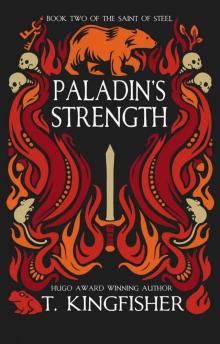 Paladin's Strength
Paladin's Strength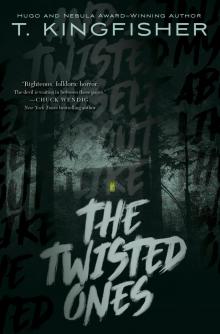 The Twisted Ones
The Twisted Ones The Hollow Places
The Hollow Places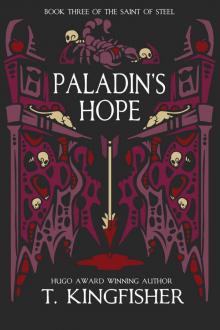 Paladin’s Hope: Book Three of the Saint of Steel
Paladin’s Hope: Book Three of the Saint of Steel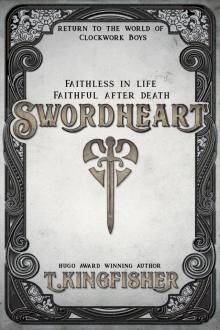 Swordheart
Swordheart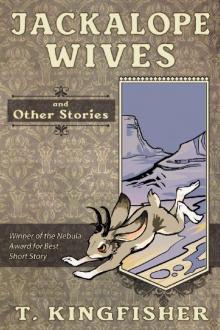 Jackalope Wives And Other Stories
Jackalope Wives And Other Stories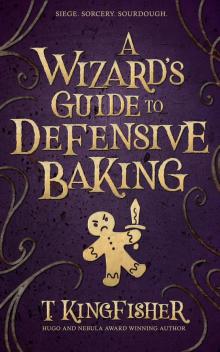 A Wizard's Guide to Defensive Baking
A Wizard's Guide to Defensive Baking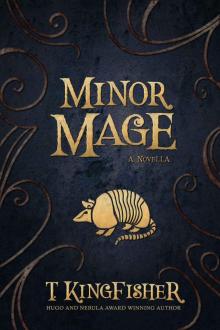 Minor Mage
Minor Mage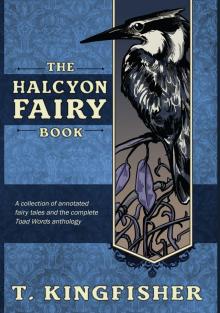 The Halcyon Fairy Book
The Halcyon Fairy Book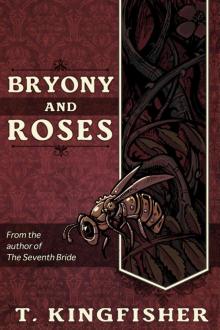 Bryony and Roses
Bryony and Roses The Wonder Engine_Book Two of the Clocktaur War
The Wonder Engine_Book Two of the Clocktaur War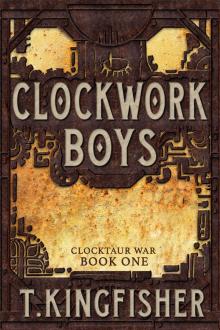 Clockwork Boys: Book One of the Clocktaur War
Clockwork Boys: Book One of the Clocktaur War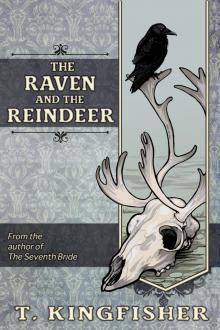 The Raven and the Reindeer
The Raven and the Reindeer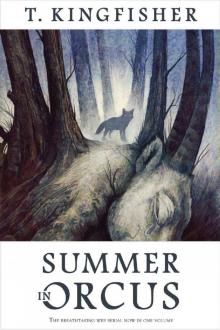 Summer in Orcus
Summer in Orcus The Wonder Engine
The Wonder Engine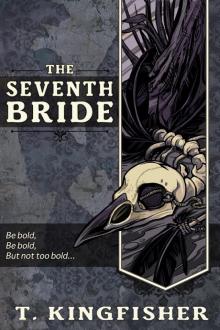 Seventh Bride
Seventh Bride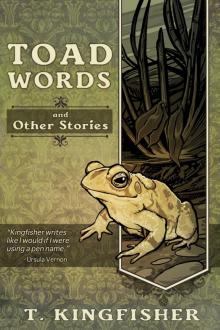 Toad Words
Toad Words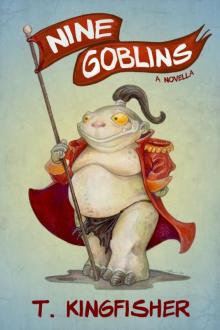 Nine Goblins
Nine Goblins